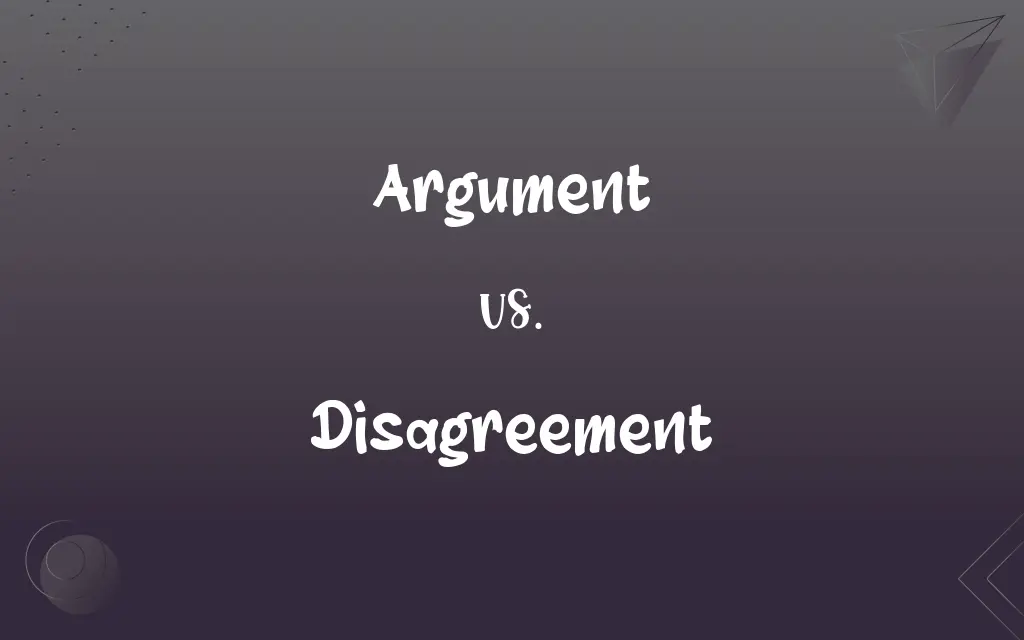Argument vs. Disagreement: What's the Difference?
Edited by Janet White || By Harlon Moss || Updated on November 2, 2023
An argument is a series of statements for or against something; a disagreement is a lack of consensus or differing views.

Key Differences
An argument is typically a more structured presentation of reasons or evidence in support of a particular stance or viewpoint. It often involves critical thinking and reasoning to persuade others. Disagreement, however, is the state or condition of having a difference of opinion or conflicting views with someone else. It does not necessarily involve the structured reasoning that an argument would.
Arguments are used in various contexts such as legal cases, academic papers, and debates, where the emphasis is on logical reasoning and evidence to substantiate a claim. Disagreement, on the other hand, can occur in everyday situations and may not require any formal reasoning or evidence. It can be as simple as two people having different preferences or opinions on a subject.
An argument can become heated and intense, potentially leading to a verbal dispute, but it fundamentally remains a discourse aimed at reaching a conclusion through logic and evidence. Disagreement is often more about personal opinion and may not seek resolution through logic but rather through compromise or acceptance of differing views.
In philosophy and logic, an argument is a connected series of statements intended to establish a proposition, whereas disagreement might be simply a divergence in opinion. A philosopher presents an argument with premises and conclusions, while two individuals might express a disagreement without the structured support of premises.
Arguments can be seen as a part of formal debates where each side systematically presents their case. Disagreements can exist without any formal argument, occurring spontaneously in casual conversations when two or more parties have a different stance on any topic.
ADVERTISEMENT
Comparison Chart
Definition
A series of reasons given to support or oppose something
A lack of consensus or differing views
Structure
Often well-organized and presented logically
May not be structured, can be informal
Purpose
To persuade or prove a point
To express a difference in opinion
Requirement of Evidence
Generally requires evidence or reasoning
Does not require evidence, just opposing views
Emotional Intensity
Can be dispassionate or heated
Often personal and potentially emotive
ADVERTISEMENT
Argument and Disagreement Definitions
Argument
A summary of the subject matter of a book or article.
The argument at the beginning of the chapter lays out the main points to be discussed.
Disagreement
A difference in beliefs or views.
Their disagreement on politics made family gatherings interesting.
Argument
A process of reasoning or a sequence of logical steps.
His argument was based on a series of facts and evidence.
Disagreement
A situation where people have different opinions about something.
There was a disagreement about where to go for dinner.
Argument
A set of reasons given to persuade others that an action or idea is right or wrong.
She presented a compelling argument for why we should recycle more.
Disagreement
The act of not agreeing, varying, or not conforming.
The committee’s disagreement stalled the project’s progress.
Argument
A heated exchange or disagreement with someone.
They got into an argument over the football game.
Disagreement
A conflict arising from differences in attitude, belief, or position.
Their disagreement was due to their different upbringing.
Argument
A mathematical statement that one quantity is equal to another; a function’s input.
The argument of the cosine function was set to π/2.
Disagreement
The absence of consensus or harmony.
Despite their disagreement, they remained good friends.
Argument
A discussion in which the parties involved express disagreement with one another; a debate
Philosophical arguments over the nature of existence.
Disagreement
A failure or refusal to agree.
Argument
An angry discussion involving disagreement among the participants; a quarrel
The roommates had an argument about whose turn it was to wash the dishes.
Disagreement
A disparity; an inconsistency.
FAQs
Can an argument be constructive?
Yes, arguments can lead to constructive outcomes when done respectfully.
What constitutes an argument?
An argument consists of a series of statements or reasons to support a viewpoint.
Can a disagreement be silent?
Yes, people can disagree without expressing it outwardly.
Can arguments be planned?
Yes, formal arguments are often planned, like in debates or essays.
Can an argument have a winner?
In a formal debate, an argument can have a winner, but not all arguments have clear winners.
Is it normal to have disagreements?
Yes, it's normal and healthy to have different opinions.
Do all disagreements lead to arguments?
Not necessarily; disagreements can exist without escalating into arguments.
Are arguments based on facts?
Arguments are often based on facts, but can also include opinions.
Are disagreements harmful to relationships?
Not inherently; it depends on how they are expressed and managed.
Does disagreement imply disrespect?
No, people can disagree respectfully.
Can you have an argument with yourself?
Yes, internal conflicts can be considered a form of argument with oneself.
Can disagreements be unspoken?
Yes, disagreements can be implicit or unspoken.
Is every argument a fight?
No, an argument can be a calm and rational debate.
Is compromise a way to resolve a disagreement?
Compromise is one way to resolve disagreements.
Can a disagreement be constructive?
Yes, when handled well, disagreements can lead to growth and understanding.
Do disagreements always resolve?
No, not all disagreements are resolved, some may persist.
Can an argument be one-sided?
Arguments are typically two-sided, but one-sided arguments can occur.
Can a disagreement be professional?
Yes, professional disagreements often occur in the workplace.
Is evidence important in an argument?
Evidence is crucial in making a persuasive argument.
Is an argumentative essay always confrontational?
No, it can present a position while respecting opposing views.
About Author
Written by
Harlon MossHarlon is a seasoned quality moderator and accomplished content writer for Difference Wiki. An alumnus of the prestigious University of California, he earned his degree in Computer Science. Leveraging his academic background, Harlon brings a meticulous and informed perspective to his work, ensuring content accuracy and excellence.
Edited by
Janet WhiteJanet White has been an esteemed writer and blogger for Difference Wiki. Holding a Master's degree in Science and Medical Journalism from the prestigious Boston University, she has consistently demonstrated her expertise and passion for her field. When she's not immersed in her work, Janet relishes her time exercising, delving into a good book, and cherishing moments with friends and family.































































